人教版小学五年级英语下册重点知识归纳
人教版小学五年级英语下册重点知识归纳

Unit One My day 重点单词: eat breakfast吃早餐 have ⋯ class 上⋯课p lay sports 进行体育运动e xercise 活动,运动d o morning exercises做早操 eatdinner 吃晚饭c lean my room 打扫我的房间go for 啊 walk 散步 go shopping去买东西,购物t ake 学习,上课d ancing舞蹈 ,跳舞 take a dancing class 上舞蹈课w hen 什么时候重点句子 :1. When do you finish class in the morning? 你们上午的课几点结束 ?2. We finish class at 1 o’clock. 我们一点钟结束上午的课.3. What do you do on the weekend?你周末在做什么 ?4. I often watch TV and play ping-pong with my father. 我 ,也常和我爸爸一起球.口语交际: 一 A: When do you finish class in the morning? 你们上午的课 几点结束 ? B: We finish class at 1 o ’clock. Then we eat lunch at home. 一点结束。
然后我们回A: Wow! When do you go back to school after lunch? 午饭后几点到校?B: At 2:30. Classes start at 3 o ’clock. 两点半到校,三点上课。
A: When do you usually eat dinner in Spain? 在西班牙你们通常几点吃晚饭?B: Usually at 9:30 or 10 o ’clock. 通常在九点半或十点。
人教版小学五年级英语下册知识点汇总(完整版)

Unit1 My day 知识点总结一、语音cl — [cl] : clean classpl — [pl] : eggplant茄子 please play注意:cl 和 pl 放在词尾与 e 结合变为cle 和 ple 时发音不同.如people,apple。
二、词汇1、日常活动词汇do morning exercises(做早操)eat breakfast/lunch/dinner(吃早餐/午餐/晚餐)have...class(上…课)take a dancing class(上舞蹈课)play sports(做运动)go for a walk (散步)clean my room(打扫我的房间)go shopping(购物)2、其他词汇exercise 活动;运动 take学习;上(课)dancing跳舞;舞蹈when什么时候;何时 after在(时间)后 start开始(反义对应词finish完成)usually 通常地;惯常地 Spain 西班牙 late 晚;迟(反义对应词early早)why 为什么 a.m.午前;上午 p.m.午后;下午 shop去买东西;购物work 工作 last上一个的;刚过去的 sound听起来好像also 还;也busy 忙的need 需要play 戏剧剧本 letter 信Live 居住island 岛always 总是;一直 cave 山洞;洞穴go swimming 去游泳win 获胜。
三、句型以及语法知识点1、询问别人什么时候做某事某种活动的when特殊疑问句型,使用时间短语回答。
When do you do morning exercises? 你何时做早操?I do morning exercises at 7:00.我七点钟做早操。
When do you finish class in the morning? 你们上午的课到什么时候结束?We finish class at 1 o’clock.我们一点钟结束上午的课。
最新人教版五年级下册英语知识点(非常有用)
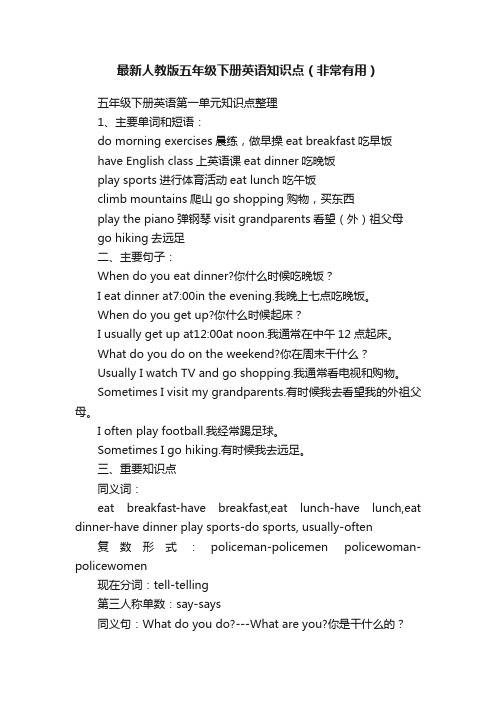
最新人教版五年级下册英语知识点(非常有用)五年级下册英语第一单元知识点整理1、主要单词和短语:do morning exercises晨练,做早操eat breakfast吃早饭have English class上英语课eat dinner吃晚饭play sports进行体育活动eat lunch吃午饭climb mountains爬山go shopping购物,买东西play the piano弹钢琴visit grandparents看望(外)祖父母go hiking去远足二、主要句子:When do you eat dinner?你什么时候吃晚饭?I eat dinner at7:00in the evening.我晚上七点吃晚饭。
When do you get up?你什么时候起床?I usually get up at12:00at noon.我通常在中午12点起床。
What do you do on the weekend?你在周末干什么?Usually I watch TV and go shopping.我通常看电视和购物。
Sometimes I visit my grandparents.有时候我去看望我的外祖父母。
I often play football.我经常踢足球。
Sometimes I go hiking.有时候我去远足。
三、重要知识点同义词:eat breakfast-have breakfast,eat lunch-have lunch,eat dinner-have dinner play sports-do sports, usually-often 复数形式:policeman-policemen policewoman-policewomen现在分词:tell-telling第三人称单数:say-says同义句:What do you do?---What are you?你是干什么的?表示频度的副词:always总是,一直;usually通常,常常;often经常;sometimes有时候以复数形式出现的词组:visit grandparents,plant trees介词后跟表示时间的词语时,表示在某年、某月、某个季节,某个时候(在上午,在下午,在晚上)用in;表示在某一天,在星期几用on,在具体的几点几分用at.too和either的用法区别:too和either都是“也”的意思,但too用于肯定句,either用于否定句。
人教版小学五年级下册英语知识点整理
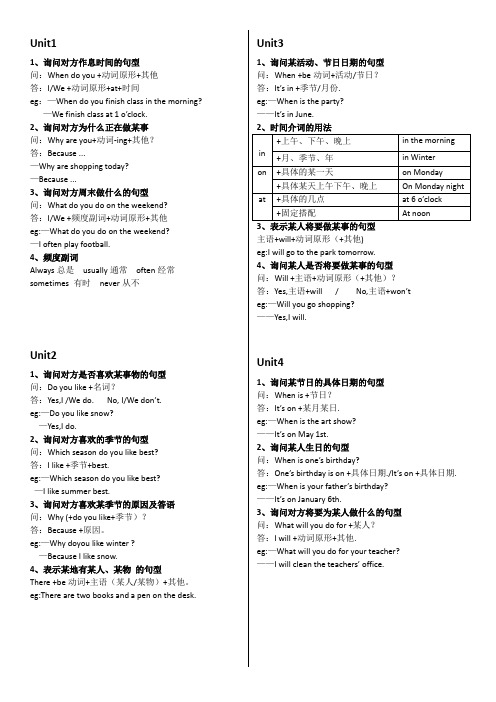
Unit11、询问对方作息时间的句型问:When do you +动词原形+其他答:I/We +动词原形+at+时间eg:—When do you finish class in the morning?—We finish class at 1 o’clock.2、询问对方为什么正在做某事问:Why are you+动词-ing+其他?答:Because ...—Why are shopping today?—Because ...3、询问对方周末做什么的句型问:What do you do on the weekend?答:I/We +频度副词+动词原形+其他eg:—What do you do on the weekend?—I often play football.4、频度副词Always总是usually通常often经常sometimes 有时never从不Unit21、询问对方是否喜欢某事物的句型问:Do you like +名词?答:Yes,I /We do. No, I/We don’t. eg:—Do you like snow?—Yes,I do.2、询问对方喜欢的季节的句型问:Which season do you like best?答:I like +季节+best.eg:—Which season do you like best?—I like summer best.3、询问对方喜欢某季节的原因及答语问:Why (+do you like+季节)?答:Because +原因。
eg:—Why doyou like winter ?—Because I like snow.4、表示某地有某人、某物的句型There +be动词+主语(某人/某物)+其他。
eg:There are two books and a pen on the desk.Unit31、询问某活动、节日日期的句型问:When +be动词+活动/节日?答:It’s in +季节/月份.eg:—When is the party?——It’s in June.主语+will+动词原形(+其他)eg:I will go to the park tomorrow.4、询问某人是否将要做某事的句型问:Will +主语+动词原形(+其他)?答:Yes,主语+will / No,主语+won’t eg:—Will you go shopping?——Yes,I will.Unit41、询问某节日的具体日期的句型问:When is +节日?答:It’s on +某月某日.eg:—When is the art show?——It’s on May 1st.2、询问某人生日的句型问:When is one’s birthday?答:One’s birthday is on +具体日期./It’s on +具体日期. eg:—When is your father’s birthday?——It’s on January 6th.3、询问对方将要为某人做什么的句型问:What will you do for +某人?答:I will +动词原形+其他.eg:—What will you do for your teacher?——I will clean the teachers’ office.1、描述物品归属的句型物品+ be动词(is/are)+(mine/his/hers/yours/ours/theirs) eg:The book is yours.2、确认物品归属地句型问:be动词+this/that/these/those(+其他)+某人的?答:Yes,it is. Yes,they are./ No,it,is’t. No,they aren’t. eg:—Is that crayou his?——Yes,it is.3、询问物品归属的句型问:单数Whose+is it/this/that?复数Whose+are they/these/those?答:It’s/They’re+名词性物主代词/ 名词所有格eg:—Whose bag is this?——It’s mine.4、现在进行时的一般疑问句问:Be动词+主语+动词-ing(+其他)?答:Yes,主语+be动词/ No,主语+be动词+not. eg:—Is she listening to music?——Yes,she is.5、描述某人正在做某事主语+be动词(am/is/are)+动词-ing(+其他).eg:I’m doing my homework now.6、询问某人能否做某事问:Can+主语+动词原形+其他?答:Yes,主语+can. /No,主语+can’t.eg:—Can I play football?——Yes,you can.Unit61、询问多个人或动物正在做什么的句型问:What are +主语(复数)+doing?答:主语(复数)+are+动词-ing+其他.eg:—What are the boys doing?——They are jumping2、询问单个人或动物正在做什么的句型问:What is +主语(单数)+doing?答:主语(单数)+is+动词-ing+其他.eg:—What is Tom doing?——He is playing football.。
(完整版)人教版五年级英语下册Unit1知识点汇总

Unit1 My day 知识整理△话题:谈论每天的活动及时间安排△词汇:do morning exercises(做早操)eat breakfast/lunch/dinner(吃早餐/午餐/晚餐)have...class(上…课),play sports(做运动)clean my room(打扫我的房间),go for a walk (散步) go shopping(购物),take a dancing class(上舞蹈课)△拓展词汇:get up(起床), go to bed(上床睡觉)wash my clothes(洗我的衣服), watch TV(看电视)do homework(做作业), play music(演奏音乐)cook dinner(煮晚餐), at home(在家)in the morning(在上午),in the afternoon(在下午)in the evening(在晚上),at night(在半夜)△句型:①询问做某事在几点When do you+动词原形(短语)+其他?—— At +时间—— I(+频度副词)+动词原形(短语)+at+时间。
例句:When do you get up in the morning?—— At 7:30.—— I often get up at 7:30.②询问周末的活动安排What do you often do on the weekend?I often (always/sometime/usually) +…(周末的活动)+with … (某人)+on the weekend (on Saturdays/on Sundays ).例句:What do you do on the weekend ?I often take a dancing class with my friend on Sundays. △知识点:1:注意介词的搭配at +具体时间(几点)/night/home at 9 o ’clock in +国家/季节 in Spainon +星期 on the weekend/on Sundays with +人 with my father/mother/friend 2:表示时间频率词的区别always 表示总是,一直;usually 表示经常,通常;often 表示经常,常常;sometimes 表示有时,间或。
人教版五年级英语下册 知识点总结

Unit 1 This Is My Day对话一:A: When do you get up ? 你什么时候起床啊?B: I usually get up at 6:30.When do you eat breakfast?A: At 6:20. What about you? / And you? 你呢?B: I usually eat breakfast at 7:00.对话二:A: Excuse me .Can I ask you some questions ? 打扰了,我能问你几个问题吗?B: Sure.A: What do you do ? 你是做什么的?B: I am a policeman .A: When do you go to work ? 你什么时候去上班?B: I usually go to work at 9:00 in the evening.A: When do you go home ?B: I go home at 5:00 in the morning .A: Thank you for telling me about your day.谢谢你告诉我你的一天。
B: You’re welcome.对话三:A: What do you do on the weekend ? 你周末干什么呀?B: Usually I watch TV and go shopping. Sometimes I visit my grandparents.What about you ? 我通常看电视和购物。
有时候去拜访我的祖父母。
你呢?A: I often play football . Sometimes I go hiking .B: That’s fun .好玩句型:1、询问某人的生活,学习规律——when do you +动词(短语)——I(usually)+动词(短语)+at + 时间.2、Excuse me . 用在打扰别人时的一种客气说法,意为:打扰了。
新人教版PEP 【小学五年级英语下册】 单元知识点 归纳总结

新人教版PEP 【小学五年级英语下册】单元知识点归纳总结Unit 1 My DayIn this unit。
we learn some core vocabulary words。
phrases。
and XXX.Core Vocabulary:1.Verbs: take (studying)。
go to (class)2.Nouns: dancing。
exercise。
sports3.Phrases: do morning exercises。
eat breakfast。
play sports。
eat dinner。
go for a walk。
go shopping。
clean my room。
take a dancing class。
have a classXXX Vocabulary:1.Verbs: start。
shop。
work。
need。
live。
win。
sound2.Nouns: Spain。
play。
letter。
island。
cave3.ns: after4.XXX: when。
XXX。
a.m。
p.m。
why。
last。
also。
busy5.nal Vocabulary: frequency adverbs (always。
usually。
sometimes)Phrases:watch TV。
eat lunch。
go to bed。
go swimming。
go home。
go to schoolCore Sentence Structure:When do you do morning exercises?" "At 7 o'clock."XXX phrase is "good job" to praise XXX.Which season do you like best。
I like winter best。
This sentence means "which one do you like the most" and "like。
【口袋书】人教版PEP五年级下册英语 基础知识汇总

人教版PEP五年级下册基础知识汇总Unit 1 My day.重点单词:[四会]dancing 跳舞;舞蹈exercise 活动;运动take 学习;上(课)[三会]after 在(时间)后start 开始usually 通常地;惯常地Spain 西班牙late 晚;迟a.m.午前;上午p.m.午后;下午why 为什么shop 去买东西;购物work 工作last 上一个的;刚过去的sound 听起来好像also 还;也busy 忙的need 需要play 戏剧;剧本letter 信live 居住island 岛always 总是;一直cave 山洞;洞穴win 获胜重点短语:eat breakfast 吃早饭have … class 上…课play sports 进行体育运动do morning exercises 做早操eat dinner 吃晚饭clean my room 打扫我的房间go for a walk 散步go shopping 去买东西;购物take a dancing class 上舞蹈课go swimming 去游泳start class 开始上课last night 昨天晚上after lunch 午饭以后a lot of fun 许多乐趣live on an island 住在一座岛上be good at sports 擅长体育运动字母组合cl 发/kl/ 音:clean 打扫clock 钟class 课;班级clever 聪明的clock 钟字母组合pl 发/pl/ 音:plate 盘子;碟子eggplant 茄子please 请play 玩耍;戏剧重点句型:1.询问别人什么时候做某事的问句及回答:-- When do/does + 主语+ 动词(短语)原形(+ 其他)?-- 主语(+ 频度副词)+ 动词(短语)原形/ 第三人稀单数形式+ at + 具体时间/ At + 具体时间.-- When do you get up? 你什么时候起床?-- I get up at 5 o'clock. 我5点起床。
人教版PEP小学英语五年级下册知识点汇总(最新)
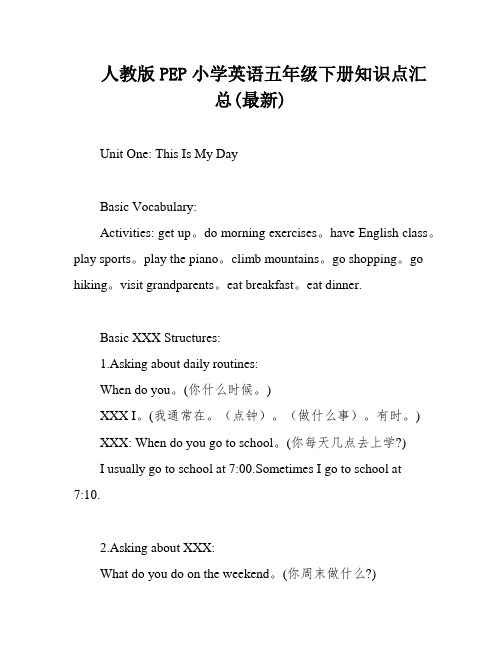
人教版PEP小学英语五年级下册知识点汇总(最新)Unit One: This Is My DayBasic Vocabulary:Activities: get up。
do morning exercises。
have English class。
play sports。
play the piano。
climb mountains。
go shopping。
go hiking。
visit grandparents。
eat breakfast。
eat dinner.Basic XXX Structures:1.Asking about daily routines:When do you。
(你什么时候。
)XXX I。
(我通常在。
(点钟)。
(做什么事)。
有时。
)XXX: When do you go to school。
(你每天几点去上学?)I usually go to school at 7:00.Sometimes I go to school at7:10.2.Asking about XXX:What do you do on the weekend。
(你周末做什么?)XXX I。
(我通常/经常。
有时。
)XXX: What do you do on the weekend?I often play XXX I go shopping with my mom.3.Introducing one's own habits:Every weekend。
I go hiking。
(我每个周末远足。
)Every day。
I do my homework at 8:00 in the evening。
(我每天晚上8点做作业。
)4.Asking XXX:What do you do。
(你是干什么的?)Time:morning。
afternoon。
evening。
noon。
at night。
6:00.on Sunday。
人教版PEP小学英语五年级下册知识点汇总(最新)
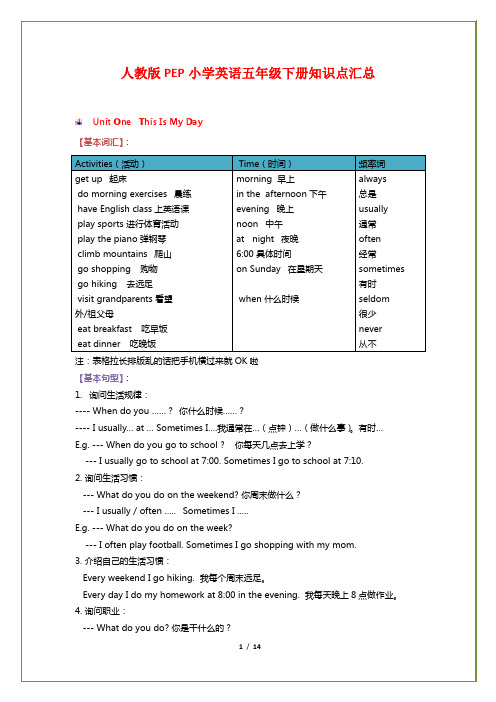
人教版PEP小学英语五年级下册知识点汇总Unit One This Is My Day【基本词汇】:Activities(活动) Time(时间)频率词get up 起床do morning exercises 晨练 have English class上英语课 play sports 进行体育活动 play the piano 弹钢琴climb mountains 爬山go shopping 购物go hiking 去远足visit grandparents 看望外/祖父母eat breakfast 吃早饭eat dinner 吃晚饭morning 早上in the afternoon下午evening 晚上noon 中午at night 夜晚6:00 具体时间on Sunday 在星期天when 什么时候always总是usually通常often经常sometimes有时seldom很少never从不注:表格拉长排版乱的话把手机横过来就OK啦【基本句型】:1. 询问生活规律:---- When do you ……?你什么时候……?---- I usually… at …Sometimes I….我通常在…(点钟)…(做什么事)。
有时…E.g. --- When do you go to school ? 你每天几点去上学?--- I usually go to school at 7:00. Sometimes I go to school at 7:10.2. 询问生活习惯:--- What do you do on the weekend? 你周末做什么?--- I usually / often ….. Sometimes I …..E.g. --- What do you do on the week?--- I often play football. Sometimes I go shopping with my mom.3. 介绍自己的生活习惯:Every weekend I go hiking. 我每个周末远足。
人教版五年级下册英语知识点整理
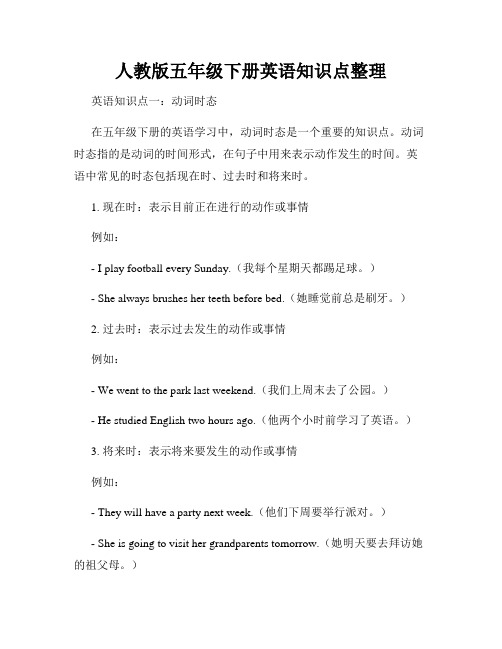
人教版五年级下册英语知识点整理英语知识点一:动词时态在五年级下册的英语学习中,动词时态是一个重要的知识点。
动词时态指的是动词的时间形式,在句子中用来表示动作发生的时间。
英语中常见的时态包括现在时、过去时和将来时。
1. 现在时:表示目前正在进行的动作或事情例如:- I play football every Sunday.(我每个星期天都踢足球。
)- She always brushes her teeth before bed.(她睡觉前总是刷牙。
)2. 过去时:表示过去发生的动作或事情例如:- We went to the park last weekend.(我们上周末去了公园。
)- He studied English two hours ago.(他两个小时前学习了英语。
)3. 将来时:表示将来要发生的动作或事情例如:- They will have a party next week.(他们下周要举行派对。
)- She is going to visit her grandparents tomorrow.(她明天要去拜访她的祖父母。
)英语知识点二:名词复数形式名词复数形式是五年级下册英语学习中的另一个重要知识点。
在英语中,名词的复数形式对于表达数量和事物的关系非常重要。
1. 一般情况下,名词的复数形式可以通过在词尾加上-s来表示例如:- book - books(书 - 书籍)- cat - cats(猫 - 猫咪)2. 以s, x, ch, sh结尾的名词,复数形式通常在词尾加-es例如:- bus - buses(公共汽车 - 公共汽车)- box - boxes(盒子 - 盒子)3. 以辅音字母+y结尾的名词,将y改成i, 再加-es例如:- baby - babies(婴儿 - 婴儿们)- city - cities(城市 - 城市)英语知识点三:形容词比较级和最高级形容词比较级和最高级是五年级下册英语学习中的重点内容。
人教版五年级英语下册全册知识点总结

千里之行,始于足下。
人教版五年级英语下册全册知识点总结人教版五年级英语下册总结1. 词汇:- 人称代词:I, you, he, she, it, we, they- 动词:be动词 (am, is, are), 常见动词 (like, have, go, do, see, eat, play)- 数字:1-1000- 家庭成员:father, mother, brother, sister, grandfather, grandmother- 学科名称:English, Chinese, math, science, P.E., music, art - 学习用品:book, pencil, eraser, ruler, sharpener, bag- 季节:spring, summer, autumn, winter- 食物:rice, noodles, bread, eggs, milk, fruits, vegetables - 动物:dog, cat, bird, fish, rabbit, panda, monkey- 蔬菜:carrot, tomato, potato, cabbage, cucumber, onion- 水果:apple, banana, orange, pear, grape, strawberry2. 句型:- What's your name?/My name is...- How old are you?/I'm ... years old.- Where are you from?/I'm from ...- What do you like?/I like ...- Can you ...?/Yes, I can./No, I can't.- What's the date today?/Today is ...- What's the weather like?/It's ...- Do you have ...?/Yes, I do./No, I don't.第1页/共2页锲而不舍,金石可镂。
(完整版)人教版PEP五年级下册英语知识点复习总结
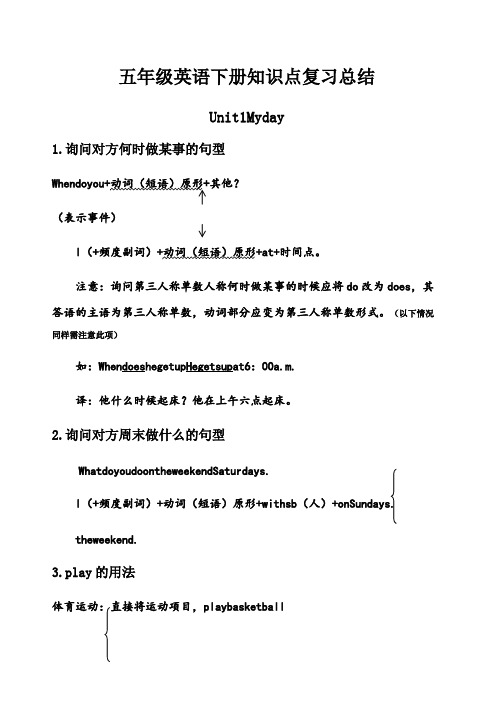
五年级英语下册知识点复习总结
Unit1Myday
1.询问对方何时做某事的句型
Whendoyou+动词(短语)原形+其他? (表示事件)
I(+频度副词)+动词(短语)原形+at+时间点。 注意:询问第三人称单数人称何时做某事的时候应将 do 改为 does,其 答语的主语为第三人称单数,动词部分应变为第三人称单数形式。(以下情况
同样需注意此项)
如:WhendoeshegetupHegetsupat6:00a.m. 译:他什么时候起床?他在上午六点起床。
2.询问对方周末做什么的句型
WhatdoyoudoontheweekendSaturdays. I(+频度副词)+动词(短语)原形+withsb(人)+onSundays. theweekend.
(2)在基数词后加 th:除去 first,second,third,其他基数词变序数词一般 直接在其后加 th。注意 five 与 twelve 要先把 ve 变 f,再加 th;eight 直接加 h;nine 去 e 再加 th。
(3)整十序数词以 ieth 结尾:整十位的序数词先将十位整数词尾的 y 变为 i, 再加 eth。如:twenty-twentieth。
The
注意:play-plays 因为 a 是元音 3)以 ch,sh,s,x 或 o 结尾的动词,在后面加-es; 例如 teach-teacheswash-washesdo-doesgo-goesfix-fixes
4)不规则的; 例如 have-has
5.by 的用法
人教版五年级下英语知识点
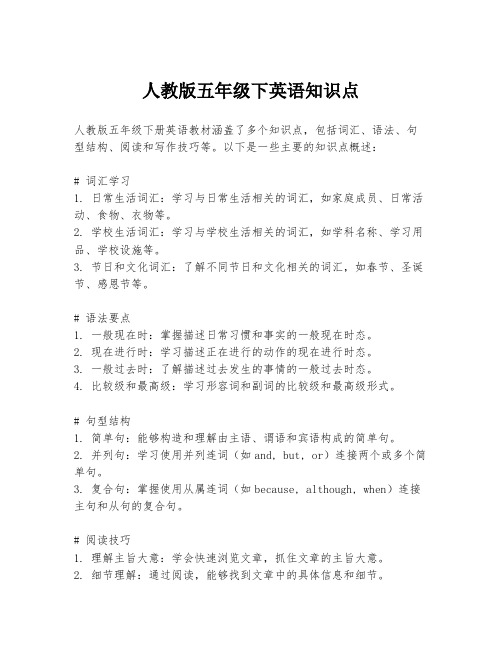
人教版五年级下英语知识点人教版五年级下册英语教材涵盖了多个知识点,包括词汇、语法、句型结构、阅读和写作技巧等。
以下是一些主要的知识点概述:# 词汇学习1. 日常生活词汇:学习与日常生活相关的词汇,如家庭成员、日常活动、食物、衣物等。
2. 学校生活词汇:学习与学校生活相关的词汇,如学科名称、学习用品、学校设施等。
3. 节日和文化词汇:了解不同节日和文化相关的词汇,如春节、圣诞节、感恩节等。
# 语法要点1. 一般现在时:掌握描述日常习惯和事实的一般现在时态。
2. 现在进行时:学习描述正在进行的动作的现在进行时态。
3. 一般过去时:了解描述过去发生的事情的一般过去时态。
4. 比较级和最高级:学习形容词和副词的比较级和最高级形式。
# 句型结构1. 简单句:能够构造和理解由主语、谓语和宾语构成的简单句。
2. 并列句:学习使用并列连词(如and, but, or)连接两个或多个简单句。
3. 复合句:掌握使用从属连词(如because, although, when)连接主句和从句的复合句。
# 阅读技巧1. 理解主旨大意:学会快速浏览文章,抓住文章的主旨大意。
2. 细节理解:通过阅读,能够找到文章中的具体信息和细节。
3. 推理判断:根据文章内容进行逻辑推理,得出结论。
# 写作技巧1. 描述性写作:学习如何描述人、地点、事物等。
2. 叙事性写作:掌握叙述一个事件或经历的写作技巧。
3. 书信写作:学习书信的基本格式和表达方式。
# 听力技巧1. 捕捉关键信息:在听力练习中,学会捕捉对话或短文中的关键信息。
2. 理解语境:通过上下文理解听力材料中的隐含意义。
# 口语表达1. 日常对话:练习日常交流中的基本对话。
2. 角色扮演:通过角色扮演活动,提高语言的实际运用能力。
# 结尾五年级下册英语的学习是一个循序渐进的过程,需要学生在老师和家长的引导下,不断练习和巩固所学知识。
通过多样化的教学活动和实践,学生可以更好地掌握英语语言技能,为未来的学习打下坚实的基础。
人教版PEP五年级英语下册各单元语法点

人教版PEP五年级英语下册各单元语法点Unit 1: What Does She Do?- 一般现在时:用于描述日常活动或惯。
主语为第三人称单数时,动词加-s或-es。
- 观察寻找规律:第三人称单数的动词加-s或-es。
- Be动词+动词-ing:用于描述正在进行的动作。
主语为第三人称单数时,be动词用is。
- 一般现在时的否定句:在动词前面加don't/doesn't。
- 一般现在时的疑问句:将do/does置于主语之前。
Unit 2: Can You Run?- Can的用法:用于表示能力和询问对方是否能够做某事。
- Can的否定形式:在can后面加not或缩略形式can't。
- Can的疑问形式:将can置于句首。
Unit 3: What Are They Doing?- 现在进行时:用于描述正在进行的动作。
动词加-ing。
- 现在进行时的否定句:在be动词后面加not。
- 现在进行时的疑问句:将be动词置于句首。
Unit 4: I'm Sitting at the Front.- 介词短语表示地点:用于描述人或物所在的位置。
- 介词on、in、under、behind、in front of、next to等的用法。
Unit 5: What Are You Going to Do?- be going to的用法:表示将来要做的事情。
- be going to的否定形式:在be动词后面加not。
- be going to的疑问形式:将be动词置于句首。
Unit 6: It's Raining!- 祈使句:用于表示请求、命令或建议。
动词原形作谓语。
- 祈使句的否定形式:在动词前面加don't。
- 祈使句的疑问形式:用Do开头。
Unit 7: How Often Do You Exercise?- 表示频率的副词:用于描述动作发生的频率。
- always, usually, often, sometimes, hardly ever, never等的用法。
人教版五年级英语下册全册知识点总结
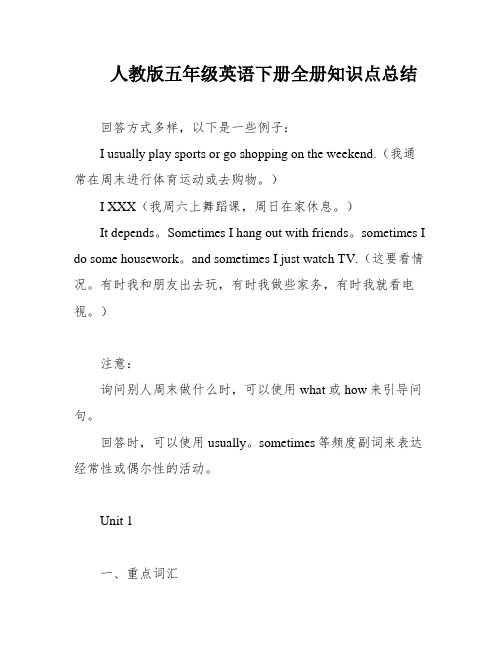
人教版五年级英语下册全册知识点总结回答方式多样,以下是一些例子:I usually play sports or go shopping on the weekend.(我通常在周末进行体育运动或去购物。
)I XXX(我周六上舞蹈课,周日在家休息。
)It depends。
Sometimes I hang out with friends。
sometimes I do some housework。
and sometimes I just watch TV.(这要看情况。
有时我和朋友出去玩,有时我做些家务,有时我就看电视。
)注意:询问别人周末做什么时,可以使用what或how来引导问句。
回答时,可以使用usually。
sometimes等频度副词来表达经常性或偶尔性的活动。
Unit 1一、重点词汇吃早餐:eat breakfast 上······课:have。
class进行体育运动:play sports做早操:do morning exercises 打扫我的房间:clean my room 去购物:go shopping舞蹈:dancing上午:a.m.通常地:usually二、其他日常活动起床:get up上床睡觉:go to bed活动,运动:exercise吃晚饭:eat XXX散步:go for a walk研究,上(课):XXX上舞蹈课:take a dancing class下午:p.m.吃午饭:eat XXX洗脸:XXX洗我的衣服:XXX看电视:watch TV打乒乓球:play ping-pong弹琵琶:play the pipa去游泳:go swimming去跑步:go running做作业:do homework练武术:do XXX踢足球:play football打篮球:play basketball三、语音cl→ [cl]:clean。
人教版小学五年级英语下册重点知识概述

人教版小学五年级英语下册重点知识概述
本文档旨在概述人教版小学五年级英语下册的重点知识,以下
是主要内容:
1. 语法知识
- 祈使句和感叹句:研究祈使句和感叹句的用法和结构。
- 定义比较句:如何使用定义比较句进行描述和比较。
- 一般过去时和现在完成时:掌握一般过去时和现在完成时的
用法和区别。
2. 词汇积累
- 动物类别词汇扩展:研究更多的动物名称和有关特征的词汇。
- 季节和天气词汇:掌握与四个季节和不同天气相关的词汇。
- 交通工具名称:研究各种交通工具的名称。
3. 句型练
- 否定句:掌握构建否定句的方法和规则。
- 疑问句:研究如何构建不同类型的疑问句。
- 动词的用法:练使用不同的动词完成句子。
4. 阅读理解
- 阅读小故事:通过阅读小故事提高理解能力。
- 根据问题选择答案:练通过问题来理解文章并选择正确答案。
- 填写正确的单词:通过填写正确的单词来完成句子。
5. 口语练
- 情景对话:练根据不同情景进行口语对话。
- 自我介绍和介绍他人:研究如何自我介绍和介绍他人的基本
用语。
以上是人教版小学五年级英语下册的重点知识概述。
希望对您
的学习有所帮助!。
人教版英语五年级下册知识点总结

人教版英语五年级下册知识点总结一、词汇核心词汇学校生活:classroom, library, playground, office, restroom, schedule, lesson, homework, break, lunch家庭成员:family, father, mother, brother, sister, uncle, aunt, cousin日常活动:get up, go to bed, wash face, brush teeth, eat breakfast, do homework, watch TV, play computer games 食物与饮料:hamburger, hot dog, sandwich, pizza, cake, cookie, milk, juice, water拓展词汇学科名称:math, science, Chinese, English, PE, art, music 颜色与衣物:red, blue, yellow, green, white, black, shirt, pants, shoes, hat, socks动物与植物:cat, dog, fish, bird, rabbit, flower, tree, grass, leaf节假日与活动:birthday, Christmas, Spring Festival, summer vacation, winter vacation, party, picnic二、语法现在进行时表达正在进行的动作或状态。
be动词(am/is/are)+动词-ing形式。
例句:What are you doing? I am reading a book. They are playing football.一般现在时表达经常性的行为或状态。
主语为第三人称单数时,动词形式要发生改变。
例句:She always washes her hands before meals. He often watches TV in the evening.一般过去时表达过去某个时间发生的动作或状态。
(完整版)人教版小学PEP英语五年级下册知识点归纳

人教版小学PEP英语五年级下册知识点归纳PEP五年级英语下册各单元知识点Unit 1 My day一、重点词汇。
1.四会词汇:eat breakfast 吃早饭 have···class 上······课play sports 进行体育运动exercise 活动;运动 domorning exercises做早操eat dinner吃晚饭clean my room 打扫我的房间go shopping 去买东西;购物go for a walk 散步take学习;上(课) dancing跳舞;舞蹈 take a dancing class 上舞蹈课2. 三会词汇:when什么时候after 在(时间)后start 开始usually 通常地;惯常地Spain 西班牙late 晚;迟 a.m. 午前;上午 p.m. 午后;下午why 为什么shop 去买东西;购物work 工作last 上一个的;刚过去的sound 听起来好像also 还;也busy 忙的 need 需要play 戏剧;剧本letter 信live 居住island 岛always 总是;一直cave 山洞;洞穴go swimming 去游泳 win 获胜二、其他日常活动。
get up起床 eat lunch吃午饭 go to bed 上床睡觉wash my face洗脸 wash my clothes 洗我的衣服 watch TV看电视play ping-pong打乒乓球 playthe pipa弹琵琶 go swimming去游泳go running去跑步 do homework 做作业 do kung fu练武术play football踢足球 play basketball打篮球三、频度副词。
always总是,一直(100%) usually通常(80%)often 经常(60%) sometimes(30%)有时四、疑问词。
人教版小学五年级下册英语知识点复习
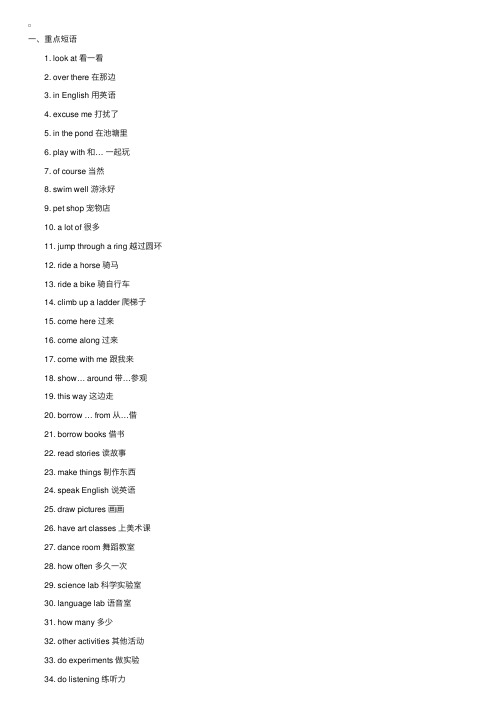
⼀、重点短语 1. look at 看⼀看 2. over there 在那边 3. in English ⽤英语 4. excuse me 打扰了 5. in the pond 在池塘⾥ 6. play with 和… ⼀起玩 7. of course 当然 8. swim well 游泳好 9. pet shop 宠物店 10. a lot of 很多 11. jump through a ring 越过圆环 12. ride a horse 骑马 13. ride a bike 骑⾃⾏车 14. climb up a ladder 爬梯⼦ 15. come here 过来 16. come along 过来 17. come with me 跟我来 18. show… around 带…参观 19. this way 这边⾛ 20. borrow … from 从…借 21. borrow books 借书 22. read stories 读故事 23. make things 制作东西 24. speak English 说英语 25. draw pictures 画画 26. have art classes 上美术课 27. dance room 舞蹈教室 28. how often 多久⼀次 29. science lab 科学实验室 30. language lab 语⾳室 31. how many 多少 32. other activities 其他活动 33. do experiments 做实验 34. do listening 练听⼒ 35. observe things 观察事物 36. do speaking 练⼝语 37. New Year’s Day 元旦 38. meeting hall 会议⼤厅 39. Children’s Day ⼉童节 40. be good at 擅长 41. be interested in 对…感兴趣 42. music club ⾳乐俱乐部 43. no one 没有⼈ 44.play the violin 拉⼩提琴 45. art club 美术俱乐部 46. come into 进⼊ 47.listen to music 听⾳乐 48. cut out 剪下 49. come from 来⾃ 50. up and down 上上下下 51. in groups 成组 52. science corner 科学⾓ 53. group work ⼩组活动 54. do project work 做项⽬制作 55. art corner 美术⾓ 56. computer corner 电脑⾓ 57.play football 踢⾜球 58. be famous for 因…闻名 59. study plants and animals 研究动植物 60. do exercises 做运动 61. on the field 在操场上 62. do printing on the paper 在纸上印刷 63. how about …怎么样? 64.go on field trips ⽥野考察 65. play volleyball 打排球 66. play basketball 打篮球 67. play hockey 打曲棍球 68. play rugby 打橄榄球 69. in the forest 在森林⾥ 70. have a look at 看⼀看 71. here you are 给你 72. how much 多少(钱) 73. a pair of ⼀双;⼀对 74. try on 试穿 75. shoe shop 鞋店 76. clothes shop 服装店 77. make a shopping list 做购物单 78. sports shop 体育⽤品商店 79. cake shop 蛋糕店 80. pay for 付钱 81. feel well 感觉好 82. see a doctor 看医⽣ 83. take good care of 好好照顾 84. have a bad cold 得了重感冒 85. have a fever 发烧 86. have a stomachache 胃疼 87. have a headache 头疼 88. have a toothache ⽛疼 89. have a cough 咳嗽 90. go to a concert 听⾳乐会 91. do maths problems 做数学题 92. go to the music club 去⾳乐俱乐部 93. have to 不得不 94. stay in bed 待在床上 95. get well 康复 96. be worried about 担⼼ 97. don’t worry 别担⼼ 98.help … with 帮助…做某事 99. in the hospital 在医院⾥ ⼆、重点短语讲解 1. play with 和…⼀起玩 play with sb.(某⼈) 和…⼀起玩 play with sth.(某物) 玩某物 e.g. Lucy and Lily are playing with their mother. Lucy and Lily are playing with their doll. 2. a lot of 很多 a lot of = lots of + 可数名词复数或不可数名词 e.g. 同义句转换 There are a lot of apples on the table. = There are ______ ______ apples on the table. (答案:lots of) 3. how often 多久⼀次 how often 是⼀个特殊疑问词,就频率提问。
- 1、下载文档前请自行甄别文档内容的完整性,平台不提供额外的编辑、内容补充、找答案等附加服务。
- 2、"仅部分预览"的文档,不可在线预览部分如存在完整性等问题,可反馈申请退款(可完整预览的文档不适用该条件!)。
- 3、如文档侵犯您的权益,请联系客服反馈,我们会尽快为您处理(人工客服工作时间:9:00-18:30)。
Unit One My day重点单词:eat breakfast吃早餐have… class上…课play sports进行体育运动exercise活动,运动do morning exercises做早操eat dinner吃晚饭clean my room打扫我的房间go for啊walk散步go shopping去买东西,购物take 学习,上课dancing 舞蹈,跳舞take a dancing class 上舞蹈课when 什么时候重点句子:1.When do you finish class in the morning? 你们上午的课几点结束?2.We finish class at 1 o’clock.我们一点钟结束上午的课.3.What do you do on the weekend? 你周末在做什么?4.I often watch TV and play ping-pong with my father. 我经常看电视,也常和我爸爸一起打乒乓球.口语交际:一A: When do you finish class in the morning? 你们上午的课几点结束?B: We finish class at 1 o’clock. Then we eat lunch at home. 一点结束。
然后我们回家吃午饭。
A: Wow! When do you go back to school after lunch? 午饭后几点到校?B: At 2:30. Classes start at 3 o’clock. 两点半到校,三点上课。
A: When do you usually eat dinner in Spain? 在西班牙你们通常几点吃晚饭?B: Usually at 9:30 or 10 o’clock. 通常在九点半或十点。
A: Wow! That’s too late! 哇,也太迟了吧二A: Why are you shopping today? 今天你怎么去购物了?B: My mum worked last night, so I’m shopping today. 我妈妈昨晚上夜班了,所以今天我购物.A: Good girl! So what do you do on the weekend? 好孩子!那你周末做什么?B: I often watch TV and play ping-pong with my father. 我经常看电视,也和我爸爸打乒乓球.A: That sounds like a lot of fun. 听起来很有意思吧.B: Yes, but I’m also hard-working. I usually wash my clothes. Sometimes I cook dinner. 是啊, 不过我也很爱干活,通常洗洗衣服,有时也做做饭.A: You’re so busy! You need a robot to help you! 你也太忙了,你需要个机器人帮忙.语音训练:辅音字母组合的发音:Cl [kl] clean clock class cleverPl [pl] plate eggplant please playUnit Two My favourite重点单词:spring春天summer夏天autumn秋天winter冬天season季节picnic野餐goon a picnic去野餐pick摘,采集pick apples摘苹果snowman雪人make a snowman堆雪人go swimming去游泳which哪一个重点句子:1.Which season do you like best? 你最喜欢哪个季节?2.I like winter best, I can sleep all day. 最喜欢冬季了. 可以整天睡觉。
3.Why (do you like summer)? 你为什么喜欢夏天呢?4.Because I like summer vacation! 因为我喜欢暑假。
口语交际;A: Do you like the music, children? 孩子们,你们喜欢音乐吗?B: Yes, it’s very beautiful. What is it? 是的,音乐太美了。
是什么音乐呢?A: The Four Seasons. Today we’ll draw the seasons. Which season do you like best, Mike? 四季歌。
今天我们学画季节。
迈克,你最喜欢哪个季节?B: Winter. I like snow. 冬天,我喜欢雪。
A: I like snow, too. Which season do you like best, Wu Yifan? 也喜欢雪。
一帆,你最喜欢哪个?C: Spring. 春季。
A: Why do you like it? 为什么呢?C; It’s pretty. 它很美。
A: Yes , it is. 可不是嘛。
语音训练;字母组合br和gr的发音:[br]和[gr][br] brown library brother umbrella[gr] green grape grandpa growUnit Three My school calendar重点单词;January 一月February二月March三月April四月May五月June六月July七月August八月September九月October 十月November十一月December十二月重点句子:1.When is the party? 聚会什么时候举行?2.It’s in April. 在4月.3.When is the trip this year? 今年的秋游在什么时候?4.It’s in October. We’ll go to the Great Wall. 在十月. 我们要去长城.口语交际:A: We have a few fun things in spring. 春季我们有几件令人开心的事情.B: What are they? 什么事呢?A: After the sports meet. We have an Easter party. 运动会后, 我们要举行复活节聚会呢B: When is the party? 聚会在什么时候?A: It’s in April. We have a school trip, too. 在4月, 我们还要进行一次郊游呢.B: When is that? 在什么时候?A: It’s in May 在5月份.B: Cool! 太好了!二A: I like autumn. I really like the colours. 我喜欢秋天, 我真的很喜欢秋天缤纷的色彩.B: I like autumn, too. We usually have a school trip in autumn, 我也喜欢秋天。
秋天我们通常要进行秋游。
A: Great! When is the trip this year? 太好了。
今年的秋游在什么时候?B; It’s in October. We’ll go to the Great Wall. 在10月。
我们会去长城。
A: Cool! I love the Great Wall. 太棒了!我就喜欢长城。
语音训练:字母组合sh和ch的发音:[ʃ]和[ʧ][tʃ] China chicken lunch teacher[ʃ] sheep fish shirt shortsUnit four When is Easter?重点单词;first第一second第二third第三fourth第四fifth第五twelfth(12th) 第十二twentieth(20th) 第二十twenty-first(21st) 第二十一twenty-third(23rd)第二十三thirtieth(30th)第三十重点句子:1.When is April F ool’s Day? 愚人节是哪天?2.It’s on April 1st. 是在四月一日3.When is your birthday? 你的生日是哪天?4.My birthday is on April 4th. 我的生日是四月四号.5.What do you usually do on Mid-Autumn Day? 中秋节你通常做什么?6.We eat mooncakes.我们吃月饼.口语交际:A: There are some special days in April四月有几个特别的日子。
B: What are they? 是什么呢?A: April Fool’s Day and Easter. 愚人节和复活节呀。
B: When is April Fool’s Day? 愚人节在什么时候?A: It’s on April 1st.四月一日。
B: And Easter? 复活节呢?A: It’s on April 5th this year. 在今年四月五日。
B: Wow! I love April. 哇,我喜欢四月。
A: When is your birthday? 你生日是什么时候?B: My birthday is on April 4th. 是在四月四日。
A: That’s my mother’s birthday, too. 那也是我妈妈的生日。
B: Cool ! What will you do for your Mum? 太妙了,你会为你妈妈做些什么吗?A: I’ll cook noodles for her. 我会为她煮面条。
B: Chinese noodles are delicious! 中国面条太好吃了。
A: Please come then, we can have a birthday party for both of you! 那就来我家吧,我们一起为你俩过生日。
语音训练字母组合th的发音:[θ]和[ð][θ] three thin thirteen maths[ð] this that mother brotherUnit Five Whose dog is it?重点单词:mine我的yours你的,你们的his他的hers她的theirs他们的,她们的,它们的ours我们的climbing(正在)攀登, 攀爬eating正在吃(东西) playing正在玩耍jumping正在跳drinking正在喝水sleeping正在睡觉重点句子:1.The yellow picture is mine.那张黄色的画是我的.2.Are these all ours? 这些都是我们的画吗?3.Whose is it? 这是谁的?4.It’s Zhang Peng’s. 是张鹏的。
